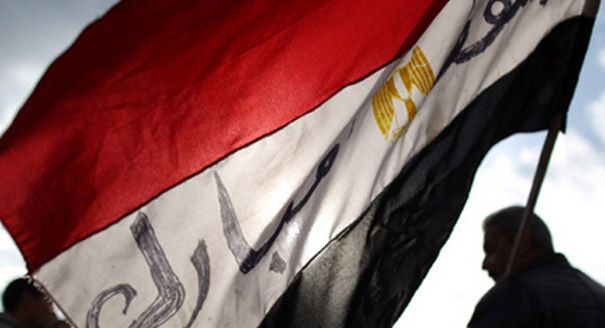The story of a has-been politician apparently caught red-handed is intersecting with the larger forces at work in the Ukrainian parliament.
Konstantin Skorkin

Source: Getty
Egypt’s best hope for a democratic transition depends heavily on the process of political reconstruction contained in the constitution-writing process.
This is part of a series of three related articles. The others are Egypt’s Ambiguous Transition and Egypt’s Potential Legislative Agenda.
Egypt’s best hope for a democratic transition depends heavily on the process of political reconstruction contained in the constitution-writing process. Actually, as with the political system as a whole, it is difficult to describe the drafting as part of any identifiable “process”; instead the drafting is buffeted by constant political and legal challenges. Those who are undertaking the task at present were chosen by a parliament later declared unconstitutional in a manner that could easily be declared illegal at any time.
As a result, the writing process is proceeding at a rushed pace because the threat of dissolution hangs over the body. The first Constituent Assembly was disbanded by the administrative courts on implausible legal grounds. Since the present assembly was formed in a similar way, it could be disbanded in its turn. The Damoclean sword hanging over the assembly has powerfully focused the attention of most drafters on their task.The drafting body seems to be making some progress and even appears to be operating in a vaguely consensual fashion, with just enough intemperate comments and controversial proposals to spice up deliberations and enliven headlines but not so many as to derail the effort. In other words, the Constituent Assembly now seems to be on fairly firm political grounds, although its legal basis remains tenuous. And the legal proceedings against the Assembly have slowed, perhaps because it is proceeding in a non-controversial manner. The next procedural ruling from the administrative courts is not due until September 24.
At first, the legal maneuvering and pressure probably made Islamists a bit more pliable, since under the Supreme Council of the Armed Forces’ (SCAF’s) June supplementary constitutional declaration, disbanding the body would have resulted in one wholly appointed by the SCAF. (One non-Islamist who is very active in the body told me that he did not favor the dissolution of the assembly but he still would be content with a SCAF-appointed replacement if the court ruled against it.) But President Morsi canceled the SCAF’s authority and took upon himself the authority to appoint a new body if one is needed. So now it is non-Islamists, some of whom have boycotted the process or threatened a boycott, who are likely to become a bit more flexible.
What of the content of the document? A rushed effort to write a consensus charter has led the assembly to fall back on the 1971 constitution as a starting point, tweaking it to make improvements and reflect the changed political realities. While textual changes may be limited, the new document may still operate in significantly different ways, some of them impossible to predict.
The uncertainty is not because of a lack of serious thinking. There is plenty of noisy debate on symbolic issues but also a salutary focus on practical improvements. Such changes will likely include more robust human rights provisions. The 1971 constitution named an impressive array of rights but left their definition to implementing legislation that often effectively undermined them; the new document might have stronger wording to prevent such a practice.
As the drafting proceeds, it is likely that this practical focus will continue and that there will be understandable struggles over the fine print, especially concerning how the various institutions of the Egyptian state will work with each other. And here it is difficult to know what to expect, because the political preferences of assembly members on many institutional questions are not completely clear. Brotherhood members, for instance, take a dim view of Egypt’s current Constitutional Court, but it is not clear how widely that sentiment is shared or what sort of textual elements they would wish to add to the skeletal provisions of the 1971 constitution.
The terms of the debate are actually narrower than the wide ideological gaps among members suggest they should be. There are some emotional and divisive matters that are more symbolic than practical (for example whether the constitutional provision for military courts should be mentioned in the section on the armed forces or the judiciary). But for the most part, participants seem to have a very good sense of what matters.
The debate about Islamic law, for instance, has been narrowed down to a few words and phrases and participants have shown a good understanding that the practical issues have less to do with general wording and far more to do with who is authorized to interpret and apply such clauses. In the end, something quite close to the 1971 constitution’s provisions will likely be presented to Egyptian voters for ratification. (Article two of that document, as its application evolved over time, allowed the Supreme Constitutional Court to measure laws against a few indisputable sharia-based rules as well as the Islamic sharia’s general goals).
Religious freedom provisions are proving to be a bit more difficult, with the degree of protection and the extent of individual choice very much up for debate. As drafting proceeds, the matter is likely to receive tremendous domestic and international attention, but much of the debate may miss the complexity of the issue.
In general, Arab constitutions tend to be more protective of collectively based religious rituals and of recognized creeds than they are of individual freedom of conscience. Initial indications suggest that this feature is likely to carry over into the draft produced by the current assembly.
There are three often overlooked reasons why rights to religious freedom are generally guaranteed and understood in communal terms rather than connected with an individual freedom of conscience.
First, one’s religious community determines the law applied in matters of personal status. This requires that the state recognize and enforce different sets of laws in matters of marriage, divorce, and inheritance. Individuals might be free to choose, but only from an approved list of recognized doctrines. Allowing a fully individual right in this context often strikes Egyptians as opening the door to legal chaos. (Absent a firmly individually based right, it may still be possible for individuals to claim whatever beliefs they like, but the consequences of subscribing to an unrecognized religion are ironic: in cases in which a citizen is not a member of a recognized community, the default law is the general Egyptian law of personal status—which is derived from the Islamic sharia.)
Second, many leaders of religious communities themselves embrace a communal rather than individual right since it offers them some corporate identity and legal protection.
Third, prevailing social practice generally starkly reinforces communal identities. Changing religion, for instance, often involves not merely declaring or observing a new faith but also breaking family ties and dense social connections in favor of new ones.
Indeed, many Islamic religious authorities in Egypt are far more inclined toward leniency than the laity in this regard. Some emerging (though not dominant) interpretations of the Islamic sharia are increasingly willing to leave any sanction for apostasy for the next world. A convert is likely to find a less patient attitude from former friends and family.
Drafters anxious to prove that religious freedom is still very much alive in Egypt are therefore more likely to focus on the rights granted to religious communities than on any individual freedoms. They may actually name those religions that will be protected. One bizarre effect of this might be to give Judaism constitutional status in Egypt for the first time—over half a century after the religion all but ceased being practiced in an unhappy ending for Egypt’s formerly substantial Jewish community.
For all the expertise being brought to bear on Egypt’s constitution, whatever document the assembly’s members write will likely operate in ways none of them anticipate if it is actually adopted. Falling back on the 1971 constitution in most places will be less determinative than it seems, because the new political environment in the country will change the impact of provisions of the 1971 constitutions. Even if its clauses on the parliament were adopted verbatim, for instance, they would likely have very different effects because whatever parliament is eventually elected is likely to be a far more diverse and lively body than those seated under Anwar al-Sadat and Hosni Mubarak. The same can be said for all the other institutions, state bodies, and commissions strewn throughout the 1971 constitution. Furthermore, in the initial period at least, the constitution will have to operate through laws and procedures that were not built for a democratic system. Any change will likely be slow, and involve significant clashes between the constitutional base and legislative superstructure.
More generally, the constitution will likely place great authority in elected officials, meaning that how that authority is used will be determined not simply by constitutional text but also by election results. In the past election results were drearily predictable. Now they are not. From the very beginning of its new life, the constitution’s meaning will be determined in part by what the voters say. Indeed, Egyptians will be summoned to the polls two (and maybe even three) times over the next year: in a constitutional referendum, new parliamentary elections, and possibly new presidential elections. Already, Egyptians are speculating on the likely outcome, often by making sometimes contradictory sweeping statements: everyone is disgusted with the Islamists; the presidential elections showed that the Brotherhood has lost its touch, eking out a victory only against a weak candidate; the Left is on the rise; the National Democratic Party will reemerge; a new center force will emerge; victory will go to the party raising the banner of social justice; only the Brotherhood has a ground game.
Before long, such sweeping claims will be tested and unanswered questions addressed. Until then only a few things are clear. Much depends on what Egyptians are voting for (presidential candidates? Party lists? Individual MPs?) and according to what rules. And with the 2011 parliamentary election law overturned it is not at all clear what rules will be used for the 2013 elections (if they are held) will be, who will write them, and how. For all the uncertainty and speculation, two trends are likely to emerge, especially in parliamentary voting. First, the sorts of local figures who used to gravitate toward the National Democratic Party, might easily improve their performance over 2011. Such candidates were either intimidated out of running or defeated in 2011, but they might be able to come forward now as representing order and access to resources.
Second, whether they decline or not, Islamists are still likely to continue to be formidable electoral actors for the foreseeable future. The strong social presence of Brotherhood and Salafi organizations throughout the country, their acuity in candidate selection, their discipline and ability to devise and follow sound tactical approaches, and their now deeper experience with competitive elections will likely make them strong players, no matter what set of electoral rules are designed. It is unclear whether the Brotherhood and Salafis will see each other as allies or rivals over the long term, but whichever is the case, democracy is likely to be good news for both of them.
Despite these difficulties and ambiguities, over the long term, there is one reason for hope about the current effort. In reading through the minutes of the drafting committees for Egypt’s longest-lived constitutions—those of 1923 and 1971—I found the discussions wide-ranging and sophisticated. But both efforts were politically flawed. The first effort was carried out without the participation of the Wafd, the country’s largest political movement of the time by far; the second operated under the watchful eye of a deeply authoritarian regime.
In Egypt of 2012, the spectrum of participation is broader, the level of public engagement far greater, and the ability of any single party to impose an outcome far more limited. A workable document could yet emerge from a process that no constitutional engineer could ever have designed in good conscience.
Carnegie does not take institutional positions on public policy issues; the views represented herein are those of the author(s) and do not necessarily reflect the views of Carnegie, its staff, or its trustees.
The story of a has-been politician apparently caught red-handed is intersecting with the larger forces at work in the Ukrainian parliament.

Konstantin Skorkin
2026 has started in crisis, as the actions of unpredictable leaders shape an increasingly volatile global environment. To shift from crisis response to strategic foresight, what under-the-radar issues should the EU prepare for in the coming year?

Thomas de Waal
While appointing Kyrylo Budanov will help shore up Zelensky’s political authority and balance the president’s inner circle, the spy chief’s political ambitions mean he could be a threat.

Konstantin Skorkin
While signaling internationally that it wants peace, the Azerbaijani regime continues to promote anti-Armenian sentiment at home to mobilize domestic support.

Bashir Kitachaev
In an attempt to stop Ukrainian drones from reaching their targets, the Russian authorities have significantly ramped up online repression.

Maria Kolomychenko